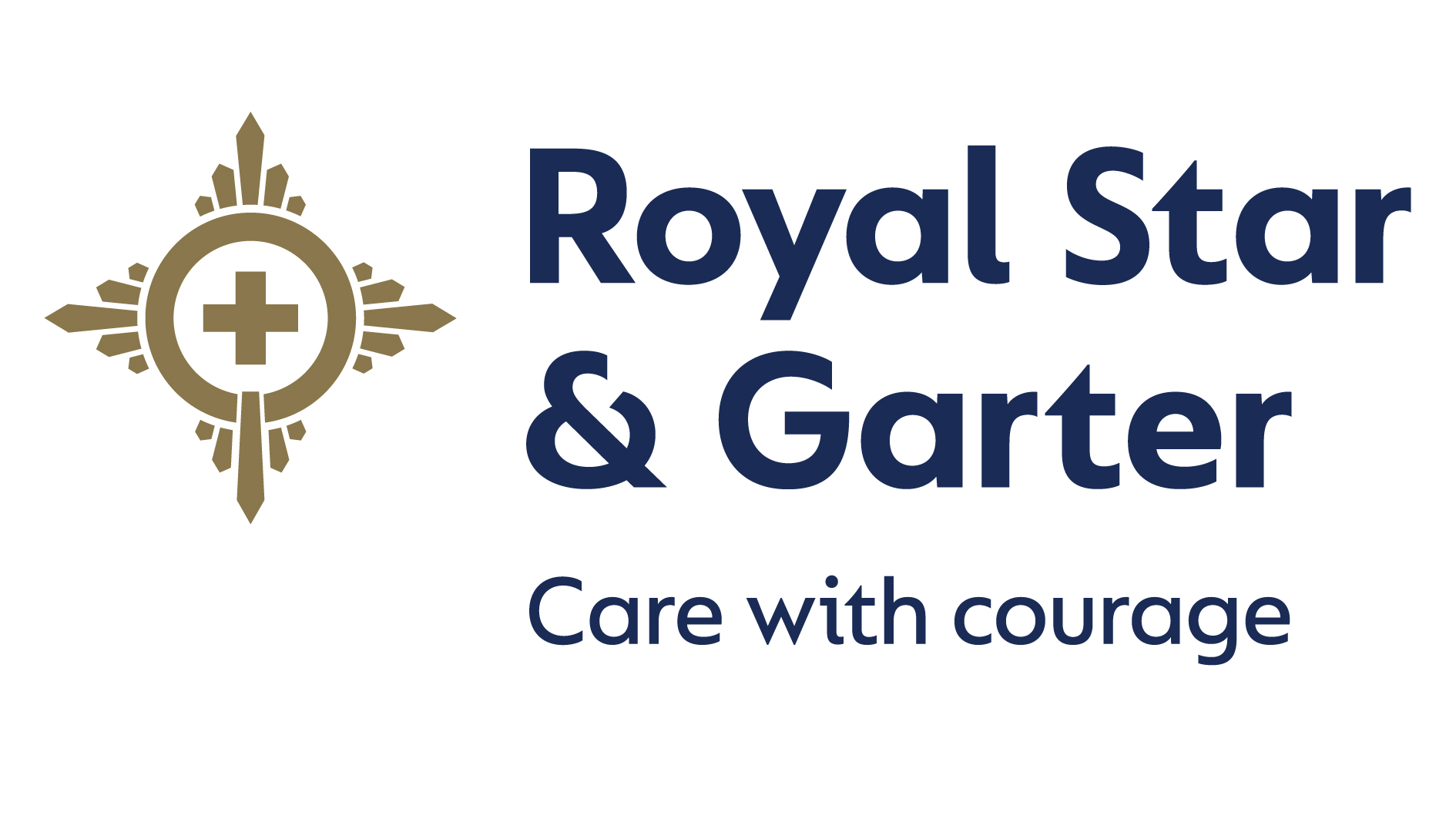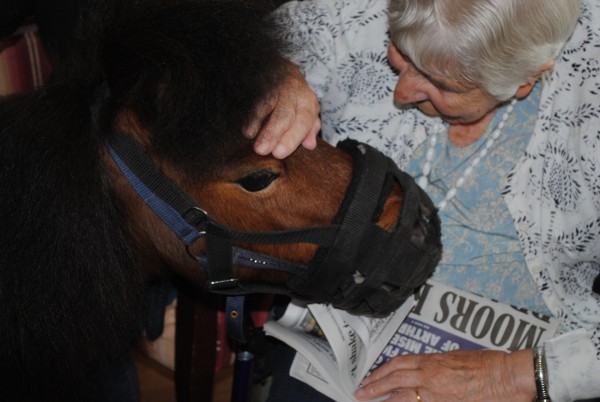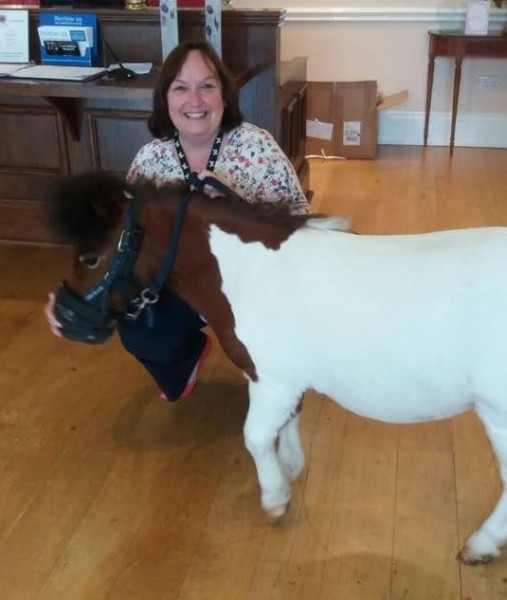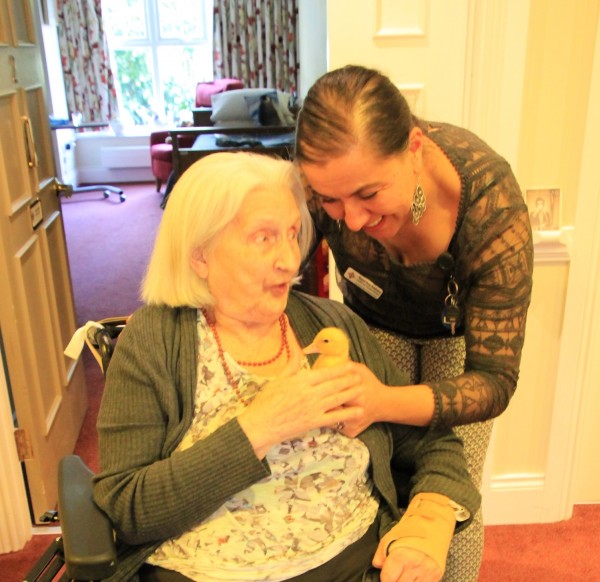To celebrate Dementia Awareness Week, military veterans living with dementia were thrilled to welcome Tickle – a delightful miniature Shetland pony owned by The Phoenix Children’s Foundation to The Royal Star & Garter Homes in Solihull. All residents at the Home were invited to meet Tickle and spend a wonderful morning in her company, with plenty of opportunity to give lots of care and affection to the tiny pony.
Tickle and her ‘petting’ animal counterparts are used as part of Animal Assisted Therapy. Research has shown that pets offer many health benefits such as lowering blood pressure and heart-rate, reducing the stress hormone cortisol and boosting levels of the feel-good hormone serotonin. Animal Assisted Therapy uses interaction with animals as a treatment to improve social, physical and emotional health. There is also evidence to suggest the therapy can reduce time spent under hospital care.
The notable benefits of using Animal Assisted Therapy for people living with dementia include greater social interaction and positive emotional expression. The individuals may gain comfort from the physical action of petting an animal; they enjoy giving affection as well as appreciating the unconditional affection the animal displays. There is also the potential to trigger fond memories of personal pets and the chance to reminisce about them.
Health Care Associate Lee explained how the visit of Tickle benefited the residents, “That pony was nice natured and he had such a calming effect on the residents. They reacted so well to him. And the smiles on their faces really shone. What a lovely morning.”
The Royal Star & Garter Homes has a long history of welcoming furry friends into our Homes. As far back as 1929, residents enjoyed interacting with the donkeys who would pull their wheelchairs up the steep hill back to the former Home in Sandgate. The donkeys proved so popular with one resident that he produced a linocut silhouette of a donkey pulling a wheelchair uphill for The Star & Garter Magazine.
The first reported use of animals as a form of therapy dates back to the early 19th Century when Florence Nightingale introduced small pets to wounded soldiers. She found that the pets eased distress among her patients. She called it “animal-companion therapy”. In the mid-1960s Dr Samuel Cordon’s research was credited with helping to stimulate a surging new interest in animal therapy. As a result of his studies and a host of research by others, animals have become commonplace visitors to nursing homes and other care environments.
Animal Therapy is a regular activity at both the Solihull and Surbiton Homes. Surbiton have three PAT (Pets as Therapy) dogs that make weekly visits to all the residents. We are also lucky enough to have a furry feline resident in Solihull. Biggles is a Ragdoll cat who likes to walk around the Home and provide comfort not only to residents with dementia, but the Home as a whole.
The Charity’s dedication to providing the highest possible dementia care has meant The Royal Star & Garter Homes has achieved national recognition in both Homes for dementia care, including awards for Best Care Team, Best Relative Involvement and Best Interior Design in Dementia Care.
Ends
For further information please contact:
Diane Fisher, Press Officer, e: diane.fisher@starandgarter.org, t: 0208 481 7669
Cally Madden, Marketing & Communications Manager, e: cally.madden@starandgarter.org, t: 020 8481 7692
Michelle Danks, Senior Marketing & Communications Manager, e: michelle.danks@starandgarter.org, t: 020 8481 7691
About The Royal Star & Garter Homes:
The Charity provides award-winning care for veterans and their spouses who live with a disability or dementia.
The Royal Star & Garter Homes is a charity founded in 1916 to care for the severely injured young men returning from the battlegrounds of the First World War. Today we provide specialist care to the whole military family in our friendly, state-of-the-art Homes. Disabled ex-Servicemen and women, and their spouses, can all benefit from our pioneering approach to nursing, dementia and therapeutic care.
We are in the process of building new Homes around the country to provide specialist nursing care for disabled ex-Service people in the best modern surroundings, including dementia care facilities to address this growing need. The Charity has award-winning Homes in Solihull, West Midlands, and Surbiton, Surrey, which also enables the Charity to offer interim care for young disabled Service personnel. Following the successes of the first two Homes, a third Home in High Wycombe, Buckinghamshire, is being built, with a planned opening in 2018.
We are proud to have enjoyed Royal patronage since our foundation, including that of Her Majesty Queen Elizabeth II from 1953 to the present day.
The Charity celebrated its centenary in 2016: providing specialist care for disabled veterans since 1916.
Twitter: @starandgarter
Facebook: facebook.com/starandgarter
Website: www.starandgarter.org




















